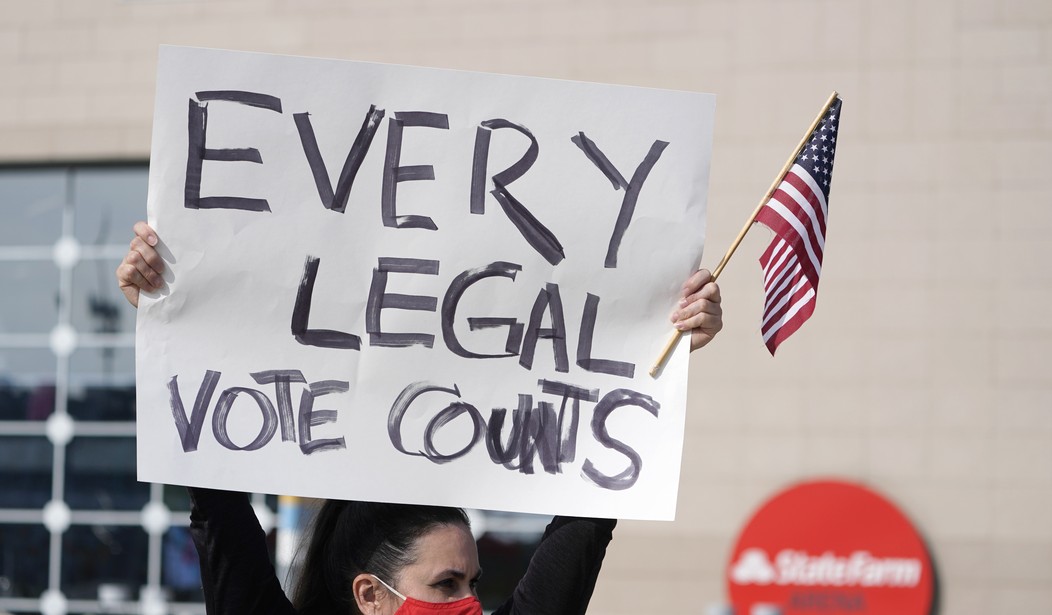The nation is wrestling with profound political confusion. The 2020 election results are controversial, allegations of election fraud unresolved, and a constitutional crisis simmering. Everybody wants to know – Is it over? The legal answer, unless Trump concedes, is “no.” To understand this, one must see how our Founders configured the Constitutional process – for situations like this.
First, the Constitution’s Framers were not naïve – they knew the human tendency to bend rules, aggregate power, abuse public office, and government’s tendency to violate individual rights.
That is why we have three branches, checking each other’s powers. That is also why we have an unbridgeable Bill of Rights.
Part of not being naïve was knowing state election management could involve fraud. The Framers distrusted political parties, thought them spoilers, detracting from unity. What they did not anticipate was a very close election, 330 million Americans, and disrespect for history.
Regardless, Framers saw an “independent judiciary.” In 1803, Marbury v. Madison, the Court said: “It is emphatically the province and duty of the judicial department to say what the law is.”
Now, 217 years later, that ruling – with refinements and 14th Amendment’s application of “due process” and “equal protection” to the States – is vital. Whether constitutional violations occurred in administering the presidential election – rests with the US Supreme Court.
That, in turn, is why the answer is “no, this is not over.” Votes are still being counted and recounted. Election results are being challenged. Likelihood grows that the Supreme Court will be asked to validate or invalidate vote counts, based on constitutional principles.
Recommended
To be clear, this is the High Court’s role. What they decide – will be final. No congressional or presidential action, let alone state attorney general, can upend it. That is why, with some grousing, the Supreme Court’s 2000 election decision was universally accepted.
Okay, so where are we – on the merits? While events keep changing, here is the latest. National media, which have no constitutional authority, have “declared” Joe Biden victor. They do this on facial evaluation of state counts. As these are challenged, the declaration has no authority.
What matters now are lawsuits, and Supreme Court rulings – plus the electoral college. Lawsuits have been filed in many states. Allegations differ, but all suits hit at election integrity.
Here is a top view.
In Pennsylvania, litigation is over counting ballots arriving days late. Before the election, the state’s highest court allowed the practice, Trump appealed, the Supreme Court split 4-4. Post-election, Justice Alito ordered constitutionally questionable ballots kept separate. Now, nine justices – with Justice Amy Coney Barret – populate the Court. Things could change.
Arguments in Trump’s favor include the Constitution’s delegation to state legislatures, not election officials, the matter of vote counting. Pennsylvania’s legislature played no role. Precedent exists to support Trump’s position, which could win over Alito, Gorsuch, Kavanaugh, Thomas, and now Barret. Of course, unknown is how many ballots are affected.
Other issues call Pennsylvania’s tally into question, including allegations of ballot “curing,” especially in Montgomery County. Voters were informed of ballot errors, permitted to recast. How widely, how often, affecting how many votes? Unclear. Citing Bush v. Gore (2000), invalidation could occur if all voters do not have “the same opportunity to vote.”
Other problems include blocking poll observers, irregularities in voter identification, ballot harvesting (that is, third-party collection), discarding ballots (including military), arbitrary deadlines, inexplicable pauses in counting, and sudden arrival of late ballots – for Biden.
In razor-thin Michigan, suits seeking redress for non-transparent counting were dismissed, yet others are pending. Allegations include a possible software “glitch” recording Trump votes for Biden, tampering at drop-boxes, blocking observers – especially in Detroit. Claims are detailed, numerous, and credible. Dismissed suits will be appealed.
In Wisconsin, expect a recount. The state must certify, taking weeks. One allegation is more votes were counted than registered, although reports are conflicted. Another suggests systemic count problems. Cross checks in this state are thorough, so evidence – if there – will surface.
In Georgia, where a solid Trump lead evaporated late – as in other states – questions abound. One allegation, supported by affidavits, is that votes received after polls closed were counted in Democrat strongholds, including Chatham County. Breaking news suggests more than 100,000 ballots potentially “ineligible” to be counted.
In Nevada, counting appears marred by thousands of non-residents voting, as well as dead people. The state’s Attorney General affirmed irregularities, although lawsuits will show seriousness. Counting will not end until November 12, as some counties remain unreported.
In Arizona, Biden’s margin continues to narrow. Lawsuits remain to be filed, but thousands of ballots must be counted. Claims surrounding “sharpie pens” seem dubious. On the other hand, the vote margin is thousands, and unresolved questions remain.
So, where does all this leave us? In the courts – with all eyes on the Supreme Court. Those celebrating Biden are premature. Media calls are fine – but final word has not been rendered. The possibility remains that the Supreme Court will invalidate ballots on which Biden depends.
Being clear-eyed is hard – especially with passions high. Biden may prevail, fraud may have occurred but be unprovable, or insufficient to throw an election. On the other hand, the Supreme Court could rule Biden’s victory unwarranted – and Donald Trump the winner. Truth is, we do not yet know. Only one thing is certain – lawsuits abound, and this election is not over yet.
Robert Charles is National Spokesman for the Association of Mature American Citizens (AMAC) a 2.3 million-strong, non-partisan group for Americans 50+, a former assistant secretary of state for President George W. Bush, a former naval intelligence officer and a litigator. He served in the Reagan and Bush 41 White Houses.
























Join the conversation as a VIP Member